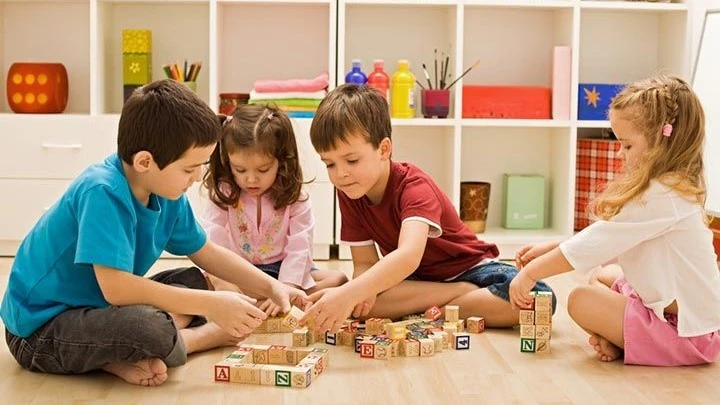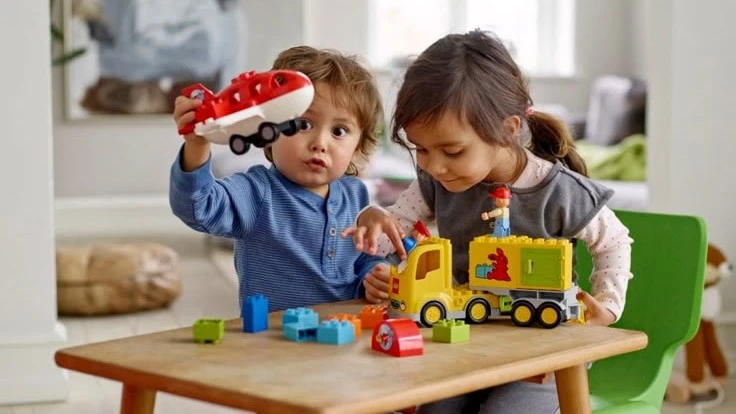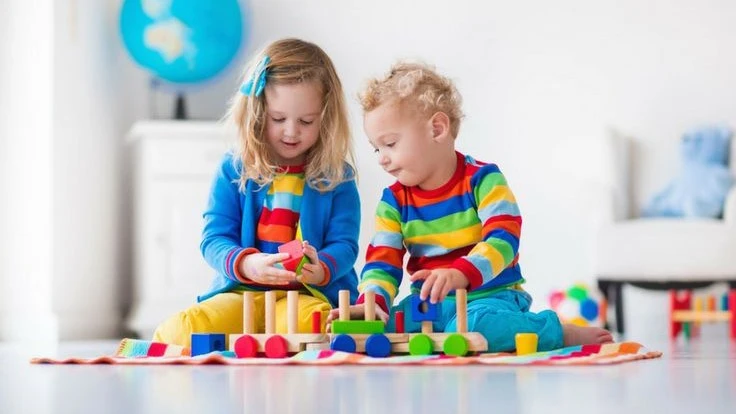Toddlers start developing social skills from the moment they enter the world!
By age three, they’ve already built foundational behaviors that shape how they interact with others.
Studies show that strong early social skills are linked to better academic and emotional outcomes later in life. Social skills development isn’t just about making friends—it’s about learning to communicate, express emotions, and work together with others.
Teaching social skills takes patience, creativity, and lots of trial and error.
In this guide, we’ll walk through key social skill milestones from birth to age 3 and 10 easy ways to encourage your toddler’s social development through simple, practical strategies. Let’s get started!
Social Skill Milestones by Age (0-3 Years)
Understanding how toddlers develop social skills step by step can help set realistic expectations. Kids grow at different rates, but here’s a general timeline:
- 0-6 months: Babies recognize familiar faces, respond to smiles, and coo to engage.
- 6-12 months: They begin babbling, imitating sounds, and showing early attachment.
- 12-18 months: Waving, pointing, and showing preferences for familiar people emerge.
- 18-24 months: Toddlers engage in parallel play, copy actions, and attempt simple sharing.
- 24-36 months: Cooperative play begins, emotions become more expressive, and turn-taking develops.
As child psychologist Dr. John Gottman says, “Children learn emotional intelligence by interacting with others. The earlier we guide them, the better.”
10 Ways to Boost Your Toddler’s Social Skills
1. Encourage Playdates & Group Activities
Toddlers need to be around other kids to learn cooperation.
I remember setting up a playdate and expecting my son to jump right in and play. Instead, he sat next to his friend, doing his own thing.
That’s totally normal! This is called parallel play, and it’s a key stage in social skills development. Over time, toddlers move from playing side by side to engaging with others in more interactive ways.
As child development expert Fred Rogers once said, “Play is the work of childhood.”
Encouraging social play, even when it looks disconnected, is a big step toward building friendships.

2. Teach Turn-Taking & Sharing
Most toddlers hate sharing—let’s be real!
Instead of forcing it, introduce turn-taking games like rolling a ball back and forth. These simple games help toddlers understand patience and cooperative play.
Sharing doesn’t come naturally at this age. Studies show that most children don’t fully grasp the concept until around age three. That’s why making it fun and low-pressure is the best approach.
Encouraging turn-taking in play builds trust and makes sharing a positive experience.
But wait—there’s more! Toddlers also learn by watching how we share and interact with others. When they see kindness in action, they’re more likely to follow suit.

3. Model Social Behavior
Toddlers are like little mirrors—they copy everything they see. If you greet people warmly, use kind words, and show patience, they’ll naturally pick up on it.
That means every “please” and “thank you” you say is shaping their future interactions.
I’ll never forget when my daughter saw me holding the door open for someone. The next day, she did the same thing at daycare, beaming with pride.
As psychologist Albert Bandura said, “Children learn more from what you are than what you teach.” Your actions are their best lessons!
But here’s something interesting—toddlers don’t just copy what we do, they also pick up on our emotions and reactions. If they see us handling conflicts calmly and treating others with kindness, they’ll learn to do the same.
Patience plays a huge role in social skills development, especially when teaching toddlers how to interact kindly with others. If you’re struggling with staying calm during challenging moments, you might find this guide helpful: How to Have Patience with a Toddler
And here’s the best part—when they pick up these habits, they carry them for life!
4. Read Books About Social Skills
Reading is one of the easiest ways to help toddlers understand emotions and friendships. Books like Llama Llama Time to Share teach little ones about kindness, sharing, and cooperation in a way they can relate to.
I remember reading The Rainbow Fish to my son, and he was fascinated by how the fish learned to share. The next day, he handed his favorite toy to a friend without hesitation!
Books spark conversations and reinforce social-emotional learning in a fun and natural way. If you’re looking for great books to help your child with social skills development, check out this list: Buy Books on Toddler Social Skills Development.
As author Emilie Buchwald said, “Children are made readers on the laps of their parents.”
So, grab a book, cuddle up, and let the learning begin!
5. Use Pretend Play to Teach Social Interactions
Role-playing common situations—like ordering at a pretend café or playing doctor—helps toddlers practice conversation and empathy in a fun way.
I remember when my niece struggled with sharing her toys. We set up a pretend store, where she played the cashier and had to “sell” her toys to me. She loved it! By the end, she was handing out toys with a big smile, without even realizing she was practicing sharing.
As Mr. Rogers once said, “Play is really the work of childhood.”
So, grab some dolls, set up a little scenario, and let the learning happen naturally!
6. Teach Emotion Recognition & Expression
Recognizing and naming emotions is a big step in social skills development.
Using emotion flashcards or simply pointing out feelings in everyday moments (“You’re frustrated because your toy broke.”) helps toddlers put words to their emotions.
Studies show that children who can identify their feelings are better at managing frustration and solving social conflicts.
I saw this firsthand when my nephew, after weeks of practicing with an emotion chart, finally said, “I’m mad because I want the blue cup!” Instead of crying, he told us how he felt.
So, the next time your toddler is upset, help them label the feeling—it’s a small habit that makes a big difference!
7. Encourage Independent Problem-Solving
Rather than stepping in right away, let toddlers work through conflicts on their own.
Instead of grabbing the toy for them, try asking, “What can we do if both of you want the same toy?” This small shift encourages them to think and build confidence.
As child development expert Magda Gerber once said, “Do less, observe more, enjoy most.”
Giving toddlers space to problem-solve helps them develop independence and critical thinking skills.
8. Create Opportunities for Cooperative Play
Playing games like Ring Around the Rosie or building towers together teaches toddlers how to work as a team. These simple activities help them understand cooperation and the joy of achieving something together.
I remember watching my son and his friend struggle to build a block tower. At first, they kept grabbing pieces from each other. But after a few tries, they started working together, handing blocks back and forth. By the end, they were laughing and high-fiving after each successful stack!
As child development specialist Jean Piaget said, “Play is the answer to how anything new comes about.”
So, set up some teamwork-based play, and let your toddler learn while having fun!

9. Limit Screen Time & Promote Real-Life Interaction
Too much screen time can slow down social skills development.
The American Academy of Pediatrics recommends no more than one hour of screen time per day for toddlers, with plenty of real-world play instead.
I saw this firsthand with my nephew—he loved watching cartoons but struggled with making eye contact and talking to other kids. Once we cut back on screens and encouraged more playdates, his confidence grew, and he started engaging more with friends.
So, swap some screen time for face-to-face play—it makes a big difference in social skills development!
Wondering how much screen time is too much for kids as they grow? Check out this guide: How Much Screen Time for a Teenager?.
10. Be Patient & Celebrate Small Wins
Social skills take years to fully develop. If your toddler struggles with sharing today, they’ll improve with consistency and encouragement.
I remember when my son had a hard time saying “hi” to new people. It took weeks of gentle encouragement before he finally waved at a friend. The small wins add up!
As early childhood educator Janet Lansbury says, “Trust the process. Growth happens in its own time.”
So, celebrate every little step, because they all lead to big progress!
Common Social Challenges in Toddlers & How to Handle Them
Every child faces obstacles in social skills development. Here’s how to tackle a few common ones:
- Shyness: Encourage gradual exposure to social situations instead of forcing interactions.
- Struggles with sharing: Use turn-taking games and praise sharing moments.
- Emotional outbursts: Validate feelings before correcting behavior (“I see you’re upset. Let’s take deep breaths”).
- Separation anxiety: Build comfort with short separations before big transitions.
When to Be Concerned About Social Delays
Some kids take longer than others to develop social skills, but certain signs might indicate delays:
- Not responding to their name by 12 months
- No interest in engaging with others by 2 years old
- Extreme difficulty with transitions or group play
If you notice these signs, talk to your pediatrician. Early intervention helps and can provide support tailored to your child’s needs.
Conclusion
Helping toddlers with social skills development is a marathon, not a sprint. Through play, patience, and positive reinforcement, we can help our little ones grow into confident, socially capable kids. Celebrate every milestone, and remember—learning social skills should be fun!
What’s your biggest challenge when teaching your toddler social skills? Share your experiences in the comments below!









